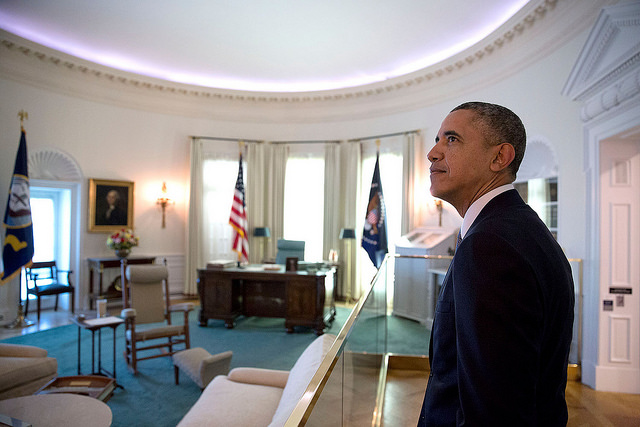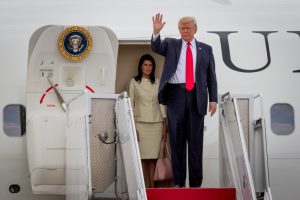by Jim Lobe
While Republicans and other right-wingers claim that President Barack Obama has inflicted unprecedented damage on Washington’s global reputation, a major new global survey suggests that the image of the US remains generally positive.
The survey, which was based on nearly 50,000 interviews of respondents in 44 countries, found that the US remains substantially more popular than China, widely considered Washington nearest geopolitical rival, in every major region except the Middle East.
A global median of 65 percent respondents said they held a positive view about the US, with majorities in 30 of 43 nations (not including the US itself) expressing a favorable opinion.
By contrast, a median of 49 percent said they felt positively about China, while 55 percent said they had an unfavorable view of the Asian giant. The most negative opinions were expressed in Europe and among some of Asia’s closest neighbors, particularly those which are contesting Beijing’s increasingly assertive territorial claims.
As for Obama himself, the first US African-American president remains broadly popular, with a median approval rating of 56 percent — about 15 percentage points higher than in the US itself — with half or more of the public in 28 of the 44 countries expressing confidence that he will “do the right thing” in world affairs.
But, like the US itself, Obama’s image remains poorest in Arab countries, Turkey, and Pakistan. By contrast, Obama’s approval ratings climbed some 10 percentage points (to 71 percent) in Israel between 2013 and 2014.
Indeed, Israel was the only country of 21 nations surveyed in 2009, when he became president and expectations for his tenure were highest around the world, where Obama’s approval ratings improved over the five-year period.
The latest survey, however, also found major plunges in his popularity in Germany and Brazil, compared to 2013, which Pew analysts attributed to revelations that the US National Security Agency (NSA) has been conducting major spying operations on the phone conversations of the two countries’ leaders.
It also found a sharp drop in positive assessments of Obama in Russia — down to only 15 percent of respondents — which Pew said was most likely related to the sharp uptick in bilateral tensions over ongoing crisis over Ukraine and Moscow’s annexation of Crimea.
The Pew poll, which was conducted between mid-March and early June, is the latest in an annual series that the organization’s “Global Attitudes Project” has carried out since 2002. The surveys have covered public opinion on a broad range of international issues in as few as nine and as many as 47 each year over that period.
The survey is quite comprehensive in scope, and its results are released in installments over the summer. Last week, for example, Pew released findings regarding Russia’s global image, which, according to the survey, had suffered in every region of the world over the past year, particularly in Europe and the US where nearly three in four respondents reported unfavorable views of Moscow.
The 44 countries polled in the latest survey, for which full results will be released in stages over the coming weeks and months, included nine European countries — France, Germany, Greece, Italy, Poland, Russia, Spain, the UK, and Ukraine; seven countries in the Greater Middle East — Egypt, Israel, Jordan, Lebanon, Palestine, Tunisia, and Turkey; and 11 Asian nations — Bangladesh, China, India, Indonesia, Japan, Malaysia, Pakistan, Philippines, South Korea, Thailand, and Vietnam.
In Latin America, the survey included Argentina, Brazil. Chile, Colombia, El Salvador, Mexico, Nicaragua, Peru, and Venezuela; while seven sub-Saharan countries were surveyed — Ghana, Kenya, Nigeria, Senegal South Africa, Tanzania, and Uganda. The US itself was included in the survey.
In addition to comparing perceptions and images of the US and China, the latest showed focused on international reaction to disclosures by former NSA employee Edward Snowden about Washington’s use of electronic surveillance of foreign leaders and citizens, as well as Washington’s reliance on drone aircraft to kill alleged terrorists in foreign countries.
The survey found strong opposition nearly across the board — except in the US itself — to both activities, although it also found little evidence in most countries that they had significantly harmed Washington’s image.
In 37 of the 44 countries, half or more of respondents said they disapproved of drones strikes against suspected terrorists. In 26 countries, more than seven of 10 respondents said they opposed the practice.
As important, perhaps, the survey found that opposition to drones strikes has grown steadily — and significantly in a number of countries, particularly Senegal, Uganda, France, Germany, the Philippines, Mexico, Japan, and even within the US itself — compared to 2013, when Pew asked the same question.
Overall, opposition was found to be strongest in Latin America, the Greater Middle East, Greece, Senegal, Spain, and Japan. On the other hand, pluralities and majorities in Israel, the US, Nigeria, and Kenya said they approved of Washington’s use of drone strikes.
As to the NSA’s monitoring activities, majorities in most countries said they approved of efforts to spy on terrorists. At the same time, majorities in nearly all of the countries said they opposed US monitoring of emails and phone calls of foreign leaders, and particularly average citizens. That latter sentiment was particularly strong in Greece, Brazil, Egypt, Jordan, and Tunisia, according to the survey.
On China’s image, pluralities or majorities in all Latin American and sub-Saharan African countries covered by the survey held positive views. In other regions, however, impressions were far more mixed.
Majorities in the US, France, Spain, Poland, Germany, and Italy held said their overall views were negative, while in Ukraine and Russia, nearly two thirds of respondents said they had a positive image of China. The Greater Middle East was similarly split, with the most positive views found in Tunisia and Palestine, while Jordan and Turkey were strongly negative.
Majorities in six of the 10 Asian countries (not including China itself) of up to 78 percent (Pakistan) expressed favorable views, while respondents in the three countries with which China has ongoing maritime disputes — Philippines, Vietnam, and Japan – were strongly negative. In India, where the land border with China remains in contention, a plurality of respondents voiced negative view of their northern neighbor.
The survey found a growing belief — compared to 2008 when Pew asked the same question — that China will eventually replace the US as the world’s greatest superpower or has already done so.
A global median of 49 percent of respondents agreed with that proposition, compared to 32 percent who disagreed. In 2008, just before the global financial crisis that broke out with the collapse of the US investment firm Lehman Brothers, the split was 41 percent who agreed that China would surpass the US and 39 percent who disagreed.
The latest poll found that the view that Beijing will indeed replace Washington as the pre-eminent global power was strongest in Europe (60 percent) and weakest in Asia (42 percent).
The poll also found significant generation gaps on several issues. Younger respondents were found to hold significantly more favorable views of the US than their older fellow-citizens in more than half of the countries, particularly in Asia (including China), Latin America, and Africa.
Similarly, younger respondents also held significantly more favorable views of China than their older counterparts, particularly in Western Europe, Latin America, and Africa.
This article was first published by IPS News and was reprinted here with permission.
Photo: President Barack Obama views a replica of the Oval Office at the Lyndon Baines Johnson Presidential Library in Austin, Texas, April 10, 2014. Credit: White House Photo by Pete Souza






Unfortunately, while Obama’s approval ratings are higher around the world, domestically, his ratings are as low as George W. Bush during his second term and on foreign policy matters, Obama has crossed the Mendoza Line into the 30s for Americans. While it’s nice to have support abroad, voters at home are likely to punish him and the Democrats at the polls in November potentially delivering the Senate and House both to Republicans. But foreign policy aren’t the only issues, the perceived train wreck of crises from the VA, NSA spying, a still sluggish employment picture, growing wage gap and the President’s own flippant answers to questions about his leadership raise the specter that the next two years will yield no breakthroughs on either foreign and domestic policy fronts and simply leave us with the status quo…which is nothing.
Also, I do find it ironic that even after Obama’s charm offensive to the Middle East and his calls for unilateral dialogue, his approval numbers are lowest amongst Middle East nations.
Interesting that only in Israel “O” rose in popularity from the past, even though it’s own Netanyahoo rags “O” when ever he can. As for the rest of those surveyed, the youth of today are the leaders of tomorrow, so they will become the deal makers, not like today.